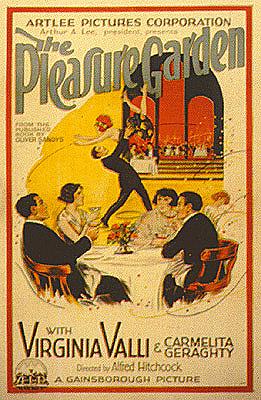
THE PLEASURE GARDEN
UK, 1925, 75 minutes, Black and white.
Virginia Valli, Carmelita Geraghty, Miles Mander, John Stuart.
Directed by Alfred Hitchcock.
The Pleasure Garden is the first full-length feature directed by Alfred Hitchcock after several attempts at directing incomplete films.
The film was a co-production between England and Germany, filmed principally in Munich with some exteriors in Italy.
Hitchcock shows a command of screen techniques with his range of close-ups, long shots, editing and pace. The film industry was less than thirty years old at this time. Hitchcock was greatly influenced by his writer, Eliot Stannard, who had written articles commenting on the nature of film-making, shots, editing, montage and pace.
The story is a familiar one. An ambitious young girl comes to London to appear on the stage. Befriended by the star, she soon eclipses her, and also takes up with rich men including a phoney prince. In the meantime her fiancé has gone abroad to work in rubber plantations. His friend woos the original actress and marries her. When she goes out to see him, she discovers that he is living with a native girl. Melodrama ensues – and the fiancé of the showgirl and the good actress are able to be united.
The film shows Hitchcock’s interest in beautiful blondes – something which was to continue for the next fifty years. He also indicates forthcoming themes of interactions between the sexes, some violence, some women as femmes fatales.
1.A Hitchcock film? Interesting in itself? Of its time? A silent film? Indication of Hitchcock’s career to come?
2.The black and white photography, the use of tinting for various scenes? The studio sets for the theatre, flats? The colonies and the rubber plantations? Italy?
3.The silent film techniques, the fixed camera, the range of shots, editing and pace?
4.The focus on Jill, her arrival in London, the encounter with Patsy, her being refused entry after her letter and money were stolen? Patsy and her kindness, sharing the apartment? Introducing her to Mr Hamilton? Her audition, the impact, her becoming a star? Her fans? Going out, the prince? Jill and her succumbing to this way of life? Her relationship with Hugh, his coming to London, her putting him at a distance? His going out to the plantation? Her plans to marry? Her refusal to give Patsy any money to go out to the plantation? Her becoming the proverbial good-time girl?
5.The contrast with Patsy, performance, a nice person, kindness to Jill, friendship with Hugh, meeting with Levett, his sweeping her off her feet, the marriage, his going out to the plantation, no letters, her concern, going out, discovering him with the girl? Her grief? Discovering Hugh ill? The melodrama leading to Levett’s death? Her realising her love for Hugh, the happy ending?
6.The men, the leering men at the theatre, their binoculars looking at the chorus girls? The ‘sugar daddies’ and taking the chorus girls out to restaurants? The contrast with Hugh, a decent young man, his love for Jill, friendship with Patsy and gratitude towards her, going out to work, falling ill, his recovery, the happy ending?
7.The contrast with Levett, seemingly dashing, attracted to Patsy, the preparation for the marriage, the ceremony, the honeymoon in Italy? His leaving, the changed person at the plantation, with the native girl? His treatment of Patsy, of Hugh? The violence and his death?
8.London, Oscar Hamilton as the entrepreneur, his shows? The contrast with Mr and Mrs Sidey and their kindness towards Patsy and Jill and offering to give the money to Patsy to go out to the plantation?
9.A film of 1925, dated and in its time, yet nevertheless interesting and a glimpse of Hitchcock?